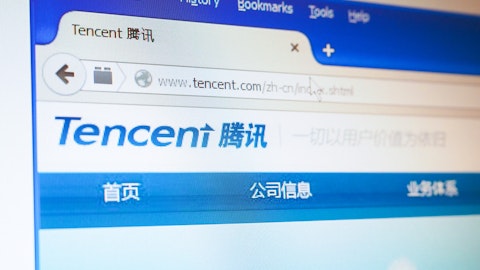Kerrisdale Capital, an investment management firm, published its second quarter 2021 investor letter – a copy of which can be downloaded here. The fund talked about two Chinese companies, and the Chinese internet market as a whole in its Q2 2021 investor letter. You can view the fund’s top 5 holdings to have an idea about their top bets for 2021.
In the Q2 2021 investor letter of Kerrisdale Capital, the fund mentioned Tencent Music Entertainment Group (NYSE: TME), and discussed its stance on the firm. Tencent Music Entertainment Group is a Nanshan, Shenzhen, China-based music company, that currently has a $17.6 billion market capitalization. TME delivered a -45.37% return since the beginning of the year, extending its 12-month returns to -36.57%. The stock closed at $10.57 per share on August 04, 2021.
Here is what Kerrisdale Capital has to say about Tencent Music Entertainment Group in its Q2 2021 investor letter:
“We are long Tencent Music Entertainment (“TME”), the leading streaming music service platform in China with over 800m active users and household brand names like QQ Music and Kugou. In addition to industry-wide regulatory scrutiny, the recent State Administration for Market Regulation (SAMR) ruling requiring TME to give up exclusivity in music content from music labels and long-term exclusivity with independent musicians has created investor uncertainty around TME’s longterm position. With a current market share of 65% in a 2-3 player market in an overall TAM growing at over 25-30%, TME is well positioned for growth even if its overall market share declines to 50%. The SAMR ruling de-risks further regulatory headwinds. We believe this presents an opportunity to acquire a leading global asset with improving unit economics driving strong operating leverage, and undergoing a transformation away from a livestreaming business to a recurring subscription-based music streaming model.
Looking ahead over the next two years, TME will benefit from several attractive growth drivers, including the number of paying subscribers growing 2x, a new ad monetization strategy driving strong ad revenue growth, and a recovery in social entertainment spending. With paid subscribers growing at a quarterly run-rate of over 5m subscribers, TME’s paying ratio (paid subscribers divided by total monthly active users) will rapidly grow to 20% over the next 12-18 months. At that level, TME would have over 130m paid subscribers and generate RMB 15b in subscription sales, up from 5.5b in 2020. Further, China’s online music paying ratio compares favorably to Indonesia (15%), Singapore (50%), US/Europe (70%) and South Korea (90%). For some additional context, in its UMG presentation Pershing Square forecast total industry-wide paid subscriber penetration in China growing from 6% in 2019 to 33% by 2030, with ARPU expected to grow at a 7% CAGR.
Despite growing subscription revenue at a 30% CAGR vs. Spotify (SPOT) at 15-20%, TME currently trades at less than half the EV/Revenue multiple of SPOT. If shares recover to their recent trading range of 5-6x EV/Revenue, and considering TME’s ownership stakes in SPOT, UMG and WMG currently valued at nearly $2b, TME shares are easily worth 3-4x their current trading levels. It’s time to turn up the volume and buy some Tencent Music.
Since announcing the $1B share buyback in March, TME bought back $200M in shares at $17/share over a 6-week period. We wouldn’t be surprised if they’ve been buying back additional shares through this recent turbulence, which can act as a further catalyst if it’s announced during their August earnings report. With a new CEO from Tencent, and the SVP of Strategy at Tencent (Jason Mitchell) now Chairman of TME’s compensation committee, TME will benefit from portfolio optimization within both audio and video, and greater synergies within the Tencent ecosystem. New product architecture and a streamlined portfolio are expected to be unveiled in 3Q, creating a positive optionality on how the overall business and its market opportunity is viewed externally.
SAMR’s new ruling mandates non-exclusive music contracts with consumption driven pricing, while explicitly prohibiting prepayment of contract fees. This will effectively lower industry-wide royalty payments, driving operating leverage to TME’s long-term business model. In an attempt to gain a dominant position in online music streaming, TME signed expensive and exclusive music contracts in 2017-2018 that expired this year. In contrast to the western world, the top five music labels in China only contribute 20-30% of total play counts, thus lowering the music label’s relative bargaining power. TME currently pays over 2b RMB in quarterly music licensing costs, and will meaningfully lower this cost while moving to a more variable cost structure. TME’s quarterly sublicense revenue of 200-250m RMB implies that TME is able to offset only a fraction of its contractual licensing costs. Even a 10% reduction in licensing expenses will drive a 250bps expansion to TME’s operating margin. In addition, the growth in long-form audio and internal content creation efforts will further lower costs, increase monetization opportunities, and expand gross margin over time. Note that in the near-term through 2021, gross margin likely remains pressured due to investments in long-form audio and higher revenue-sharing fees for WeSing livestreaming (to bring it in line with the industry average).
TME has also developed a nascent advertising business that is becoming a meaningful contributor to revenue. Management has improved its ad stack, expanded its sales force, and grown CPMs, resulting in advertising revenue growing at an over 100% CAGR since 3Q20. Unlocking additional app-based monetization methods is helpful in scaling user base and TME’s advertising business remains under-monetized vs. peers: it earned just RMB 2.6 per user in 2020 vs 10+ for many comparable platforms. As a result of its improvements, advertising now accounts for a majority of online music’s non subscription revenue. Analysts estimate that advertising revenue could grow from RMB 1.5bn in 2020 to 7bn in 2023.
Long-form audio, or podcasts, offers a third driver for TME’s music business. According to iResearch, China’s long-form audio market should grow at a 40% CAGR over the next three years. This business offers higher margins than music, since long-form audio does not require hefty content fees charged by major music labels. The business is currently a drag on profitability as TME invests in its growth. But its early success is evident with penetration exceeding 20% in 1Q 2020 from 5% a year ago, already achieving management’s 2021 goals.
TME’s legacy livestreaming and social business will lap COVID comps and is poised to recover after growing only 10% in 2020 vs. the music business growing by 30-35%. According to iResearch, the overall social entertainment market is expected to grow at over a 20% CAGR through 2022. Our recent checks suggest monthly indicators like gifting volume and active anchors are recovering sequentially in 2Q21. Although TME’s still-dominant platforms for karaoke and music-related content have lost mindshare to short-form audio and apps like TikTok, TikTok cut commission rates this year, allowing churn to stabilize and TME’s WeSing MAUs to bottom and grow again. While it remains a competitive environment, the social business is rapidly learning to cope with the evolving industry landscape.
TME’s combination of a grossly under-monetized music business and a recovering social entertainment business warrants a premium valuation. TME shares historically enjoyed a premium vs. SPOT by as much as 5 turns to revenue, but are currently trading at a 50% discount despite higher growth rates and superior long-term unit economics. As shares recover towards their recent trading range of 5.0-6.0x EV/Revenue, we believe TME shares are easily worth 3-4x their current trading levels.”

Based on our calculations, Tencent Music Entertainment Group (NYSE: TME) tops our list of the 30 Most Popular Stocks Among Hedge Funds. TME was in 63 hedge fund portfolios at the end of the first quarter of 2021, compared to 26 funds in the fourth quarter of 2020. Tencent Music Entertainment Group (NYSE: TME) delivered a -35.61% return in the past 3 months.
Hedge funds’ reputation as shrewd investors has been tarnished in the last decade as their hedged returns couldn’t keep up with the unhedged returns of the market indices. Our research has shown that hedge funds’ small-cap stock picks managed to beat the market by double digits annually between 1999 and 2016, but the margin of outperformance has been declining in recent years. Nevertheless, we were still able to identify in advance a select group of hedge fund holdings that outperformed the S&P 500 ETFs by 115 percentage points since March 2017 (see the details here). We were also able to identify in advance a select group of hedge fund holdings that underperformed the market by 10 percentage points annually between 2006 and 2017. Interestingly the margin of underperformance of these stocks has been increasing in recent years. Investors who are long the market and short these stocks would have returned more than 27% annually between 2015 and 2017. We have been tracking and sharing the list of these stocks since February 2017 in our quarterly newsletter.
At Insider Monkey, we scour multiple sources to uncover the next great investment idea. For example, pet market is growing at a 7% annual rate and is expected to reach $110 billion in 2021. So, we are checking out the 5 best stocks for animal lovers. We go through lists like the 10 best battery stocks to pick the next Tesla that will deliver a 10x return. Even though we recommend positions in only a tiny fraction of the companies we analyze, we check out as many stocks as we can. We read hedge fund investor letters and listen to stock pitches at hedge fund conferences. You can subscribe to our free daily newsletter on our homepage.
Disclosure: None. This article is originally published at Insider Monkey.





